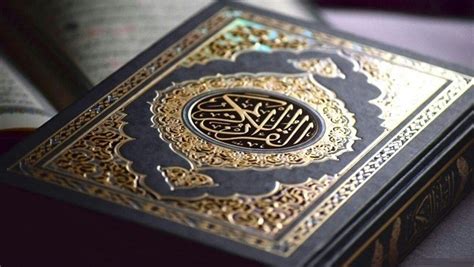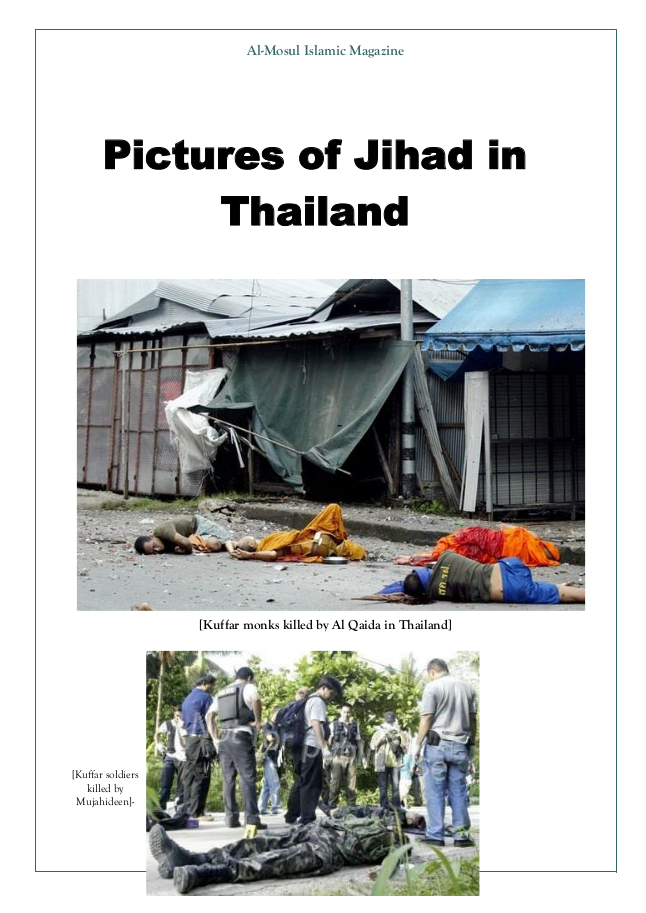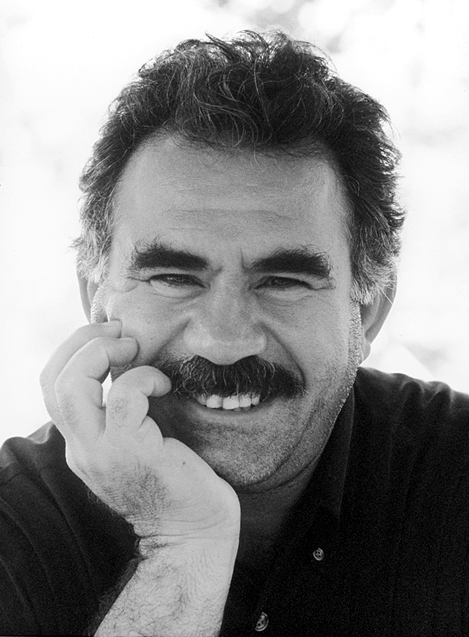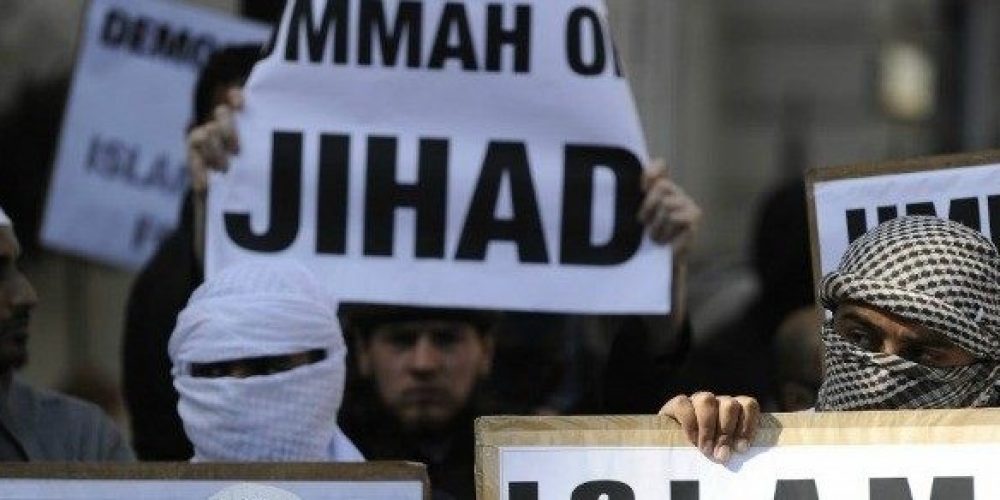Misusing the concept of jihad to legitimize violence & barbarism
In the first part of our series on the Islamic State we explained briefly the foundation, history and organization of ISIS. This article will focus on the ideological level and explain how ISIS misuses the concept of jihad to legitimize atrocities.
- 1. What is jihad?
- 2. Major and minor jihad
- 3. Jihad before and after the death of the Prophet Muhammad
- 4. Twisting the meaning of jihad
- 5. “Islam that has society as its basis is related to democracy”
- 6. Self-defense and Democratic Islam as endorsements of peaceful societies
What is jihad?
The word jihad comes from Arabic and was conceptualized for the first time with the emergence of Islam. It means working or laboring with a good and clean intention. The shortened version of the word jihid means work or labor. The origin of the word comes from pre-Islamic societies in the Middle East. For hundreds of years before the Islamic religion emerged, societies had been influenced by the values of labor, effort and hard work. With this understanding of jihad, one can say that before the development of monotheistic religions, for Middle Eastern societies, jihad was a meaningful principle of life. In other words, jihad played a sacred role in the creation of a beautiful life for the people. With the emergence of Islam, both the meaning and the concept itself became completely inseparable with God.
The emergence of religion was a significant step in the evolution of human thought. This development of the human mind can even be considered a revolution due to how it changed society so immensely. Religion established new ways of overcoming and answering the tribal problems within society that existed for hundreds of years. In the Middle East, the religion of Islam has made its impact on the society mostly through the presence of Muhammad and his sermons among the people. It is the first time that jihad is meant as in struggle in the way of God, that is, work for God. Its meaning has been explained in many verses of the Holy Qur’an. The true meaning of jihad in Islam is that which is to correct, to build, to create and maintain, that is, to do good. So for this, on the basis of God’s order and purpose, you need to struggle in jihad.
The true meaning of jihad in Islam is that
which is to correct, to build, to create and maintain,
that is, to do good.

At the beginning of Islam, when the Muslims were in Mecca, jihad was all about language, advice, prayer, and calling to take up the mission of Islam. There was no attacking, killing or war. When the Muslims were expelled from their land and immigrated, they were attacked. Then the command was given to attack those who attacked them, and drive them out of their land. But only against those who attacked them – not all people. Aside from this, the Prophet Muhammad has always told the Muslim people that the greatest jihad is the jihad against oneself and one’s own soul. In a verse of the Qur’an, when Muhammad’s army was retreating from an armed conflict, it was said that coming from the minor jihad (the physical conflict), they arrived to the most difficult jihad, the major jihad.
Major and minor jihad
In Islam there are two main concepts of jihad that have often been misunderstood and interpreted according to one’s own interests. Both of these concepts were filled with meanings that can legitimize jihad being used as a weapon against the whole world and in particular the communities of the Middle East.
The Major jihad is known as struggling in a spiritual way. This means to struggle against evil desires and to strengthen one’s will against bad thoughts, habits and practices. It is the internal struggle against and with ones self with the intention of improving the personality for good. In its essence, jihad is the struggle against morally impure characteristics, those that are not good. According to this, the most important thing is that you work on the virtues of your personality.
The Minor jihad means self-defense against hostile powers and is split into two parts: defensive and offensive jihad.
Defensive jihad (jihad al-daf‘): This can be found in the first stage of the revelation of the Qur’an when the Muslims were in Mecca. Jihad al-daf‘ means laboring for the protection of Islam. It is explained in the Qur’an that if there is an attack on Islam, then it is your right as a Muslim to defend yourselves and respond. In other words, jihad al-daf‘ means the protection of Islam against attacks. In the verses of the Qur’an, they say, until someone attacks you, you will not attack anyone, and you will not touch anyone, because God does not like violence.
In the verses of the Qur’an, they say,
until someone attacks you, you will not attack anyone,
and you will not touch anyone, because God does not like violence.
Offensive jihad (jihad al-talab): This takes place in the last stage of the Qur’an when after being attacked in Mecca, the Muslims immigrated to Medina. Because of this, in the Qur’an, it was ordered to start a war against those who had attacked the Muslims and to return to their country. According to this, it was said that if they converted to Islam and gave back the country, then it would have been obligatory to let them go. However, if they persisted in occupying Muslim lands and were not Muslims, then it was permitted to kill them. What is being said here is that no Muslims will attack others until someone attacks the land and the Muslim people. However, after the death of the Prophet Muhammad this concept of jihad was distorted and used according to personal and political benefits.

Jihad before and after the death of the Prophet Muhammad
When analyzing the concept of jihad, it is very important to differentiate between the time before the death of the Prophet Muhammad and after his death. Before his death, the greatest jihad was the jihad against oneself and one’s own personality. Carrying out jihad was done with wisdom and persuasion, not by killing and looting. After the death of Muhammad, this practice of jihad was greatly reversed. This is connected to the historical developments that happened after the Prophet’s death. Three ideological trends emerged in Islam during this time period which are all connected to the question of who succeeds Muhammad. When Muhammad died, his body remained on the ground for three days because everyone was fighting for power and they could not agree on who would take the Caliphate. Since Muhammad had not appointed a successor, and because he had no surviving sons, a conflict arose.
After the death of Muhammad, this practice of jihad was greatly reversed.
Three ideological trends emerged in Islam
which are all connected to the question
of who succeeds Muhammad.
The first ideological line can be found in the Muhajirin, which means ‘the emigrants’ and refers to those who migrated with the Prophet Muhammad from Mecca to Medina. One of them was Umar bin al-Khattab, also known as Omer, who initially opposed Muhammad but later converted to Islam and migrated to Medina. The Muhajirin said that they are the ones legitimated to take the Caliphate, because they were the first who put their trust in Muhammad.
The second one is found among the Al-Ansar, Arabic for ‘helpers’. They were the local people of Medina who welcomed Muhammad and his followers when they emigrated from Mecca. They fought with Muhammad and many of them were martyred when they stood up against the leading Arab tribe of Mecca, the Quraish. The Al-Ansar said that they will be the first to take the Caliphate, because they had shed blood at the side of the Prophet Muhammad.
The third one can be seen among the Ahl al-Bayt which refers to the family of the Prophet Muhammad. Ali bin Abi Talib was one of the members of Prophet Muhammad family, being his cousin and son-in-law. When Ali had gone to war, a council appointed Abu Bakr al-Siddiq as the first Caliph of the new Caliphate because he was the first person to spread the thought of the Prophet Muhammad and introduced him to the people.
After the death of Abu Bakr al-Siddiq, the Caliphate was subsequently ruled by Umar bin al-Khattab, then by Uthman ibn Affan, followed by Ali bin Abi Talib who became the fourth Caliph. These four are known as the rightly guided caliphs. After Ali was killed, the Caliphate fell into the hands of the Umayyad, an Arab tribe who had been in Mecca before the emergence of Islam. They continued to rule over the entire Islamic world, turning the caliphate into a dynasty with sons inheriting rule from their fathers.
After that, many religious sects emerged and conflicts broke out between Muslims. Various Islamic movements emerged that opposed the authority that had been formed, but none of them succeeded, with many of them now left in the past of Islamic history. As a result, Islam became connected to power and states, and drifted further away from the true nature of the religion.
Twisting the meaning of jihad

When the religion of Islam was increasingly used by those in power, the concept of jihad had been completely linked with the notions of armed war and killing, slaughter, beheading and bloodshed. The Prophet Muhammad warned that no one should split the Qur’an apart, divide it, or use it selectively, because the Qur’an is connected like a circle. The main goal of the emergence of Islam was to save the people from ignorance, and create social justice and peace. One principle that Muhammad named was in the instance of war – if your enemy demands peace, then you have to lay down your weapons immediately and make peace.
With this as a basis it becomes clear that the concept of jihad has been twisted and cut off from its true origins. One thousand five hundred years after the beginning of Islam, there are groups that see themselves as the only true followers of Islam, but who employ domination and the acquisition of power as a basis for their political agenda. They have stopped one of the most important elements within religion: dialogue, interpretation and discussion. This is why ISIS does not allow discussions of the interpretation of Sharia law. This is why ISIS uses the concept of jihad as a legitimization to fight “the infidels”.
Left: Jihad depicted as an act of killing ‘”infidels” by the English Islamist propaganda magazine “Defenders of Truth – Al Mosul Jihad Magazine” , October 2009)
ISIS knows that religion is highly influential in the Middle East. They use the religious feelings of the people for spreading their ideology. They claim that their rules and practices are obligatory to everyone who wants to be a good Muslim. With the aim of establishing a Caliphate, thousands of people came to Iraq and Syria to carry out jihad. ISIS used their twisted concept of jihad to deceive people. Thousands of people were forced to obey their laws, were kidnapped, tortured and beheaded – all with the legitimization through jihad. Women were both attracted on a voluntary basis and forced into jihad al-nikah, which means sexual jihad, and were married to ISIS fighters in order to create a new generation of militants.
In the name of jihad, ISIS massively damaged Islamic culture. Having created their own propaganda around the concept of jihad, ISIS was unleashed on the peoples of the Middle East like a wild beast. With the green light and assistance of the Turkish state, ISIS reached a level that if one were to just hear their name, they would run away in fear. Nation state armies and forces famous for their wars did not stand to impede ISIS, did not oppose, and ran away in cowardice.
In the name of jihad, ISIS massively damaged Islamic culture.
Jihad, in the way it was meant by the Prophet Muhammad, was based on a moral conscience. ISIS contradicted this and turned it into fighting alleged infidels. Even though Muhammad said that Islam can not be forced upon someone, and not everyone must become a Muslim, every place that ISIS occupied was ruled with harsh enforcement and violence. If we analyze according to the Islamic struggle of the Prophet Muhammad, the practice of ISIS is the practice of infidels and disbelievers. ISIS’s goal is not to build a state according to Islamic principles, but to build and expand a fascist and occupying state.
“Islam that has society as its basis is related to democracy”
As YPJ we carried out a great resistance against the ‘Islamic State’, not just militarily but also ideologically. Against their anti-human ideology, we put forward the idea of the Democratic Nation. The leader and philosopher of this paradigm, Abdullah Öcalan, has deeply analyzed the history and meaning of Islam. In the fifth part of his Defense Writings, written in solitary confinement on the Turkish prison island Imrali, he talks about the emergence of Islam: “In the history of civilization, a duality has occurred in every revolution. In the Islamic revolution, it was formed in a difficult way. Shortly after it took place, the main issue of the debate was whether it would continue in the line of the democratic revolution, or in line with the dominating revolution. From the day that Islam emerged, both trends have made themselves felt in a difficult way. The upper class of the clans and those who were eager for power tried to lead the revolution towards the Islamic sultanate, but the lower strata of the clans and the slave elements tried to lead Islam on a democratic line.”

It becomes clear that after the emergence of Islam there have been two lines: a democratic one and a oppressing one. Abdullah Öcalan continues analyzing what happens if Islam continues to be used for serving power: “Islam that has the society as its basis is related to democracy, supports the people and protects it. (…) Individual Islam, always rising with the demand for power, cuts off its deep meaning from society. It is very difficult to consider state Islam as a religion.”
“Islam that has the society as its basis is related to democracy,
supports the people and protects it.
(…) Individual Islam, always rising with the demand for power,
cuts off its deep meaning from society.”
A. Ocalan
Regarding the connection between state and religion, Abdullah Öcalan concludes: “Has the state used religion or has religion used the state? If the state uses religion, that religion has lost its identity. (…) The justification of the state by religion and the justification of the religion by the state is the top reason for religion becoming conservative, meaningless and hollow.”
Self-defense and Democratic Islam as endorsements of peaceful societies
Many countries were invaded under the name of political Islam and jihad. Today, in the Middle East but also around the world, the misuse of jihad has become one of the most dangerous tools and weapons of the consolidation of strength in patriarchy and fascism. Despite the fact that many important and beneficial developments emerged from Islam, the politics and war that is being waged by the misuse of religion is forcing a regression of society to the civilization of thousands of years ago. Prophet Muhammad’s revolution was like medicine for the society of that time. But in the hands of those who connect religion with power and the state, the medicine has turn into a poison.
As YPJ, we see organized self-defense and the discussion and development of Democratic Islam as a core element of countering ISIS ideology. When we establish a consciousness within society that allows dialogue within Islam, as well as between the different religions and beliefs, society itself will grow. Society will gain the ability to ideologically defend itself from psychological attacks such as those imposed by ISIS ideology. Self-defense is therefore not only refering to a physical defense with arms, but also to the mental terrain. In particular women, who suffered most under the misogynist attacks of ISIS, need to educate themselves and their societies to overcome the mental remnants of ISIS ideology. As YPJ and women from the Middle East, we will continue to fight ISIS and what it embodies. Against the dominant male system, we give our promise to further the women’s revolution.
In the last part of this series, we will publish an interview with a member of the leadership of the Federation of the Wounded of War in North and East Syria, where she will analyze the nature of ISIS and tell her own experience fighting them in the Battle of Kobane.


